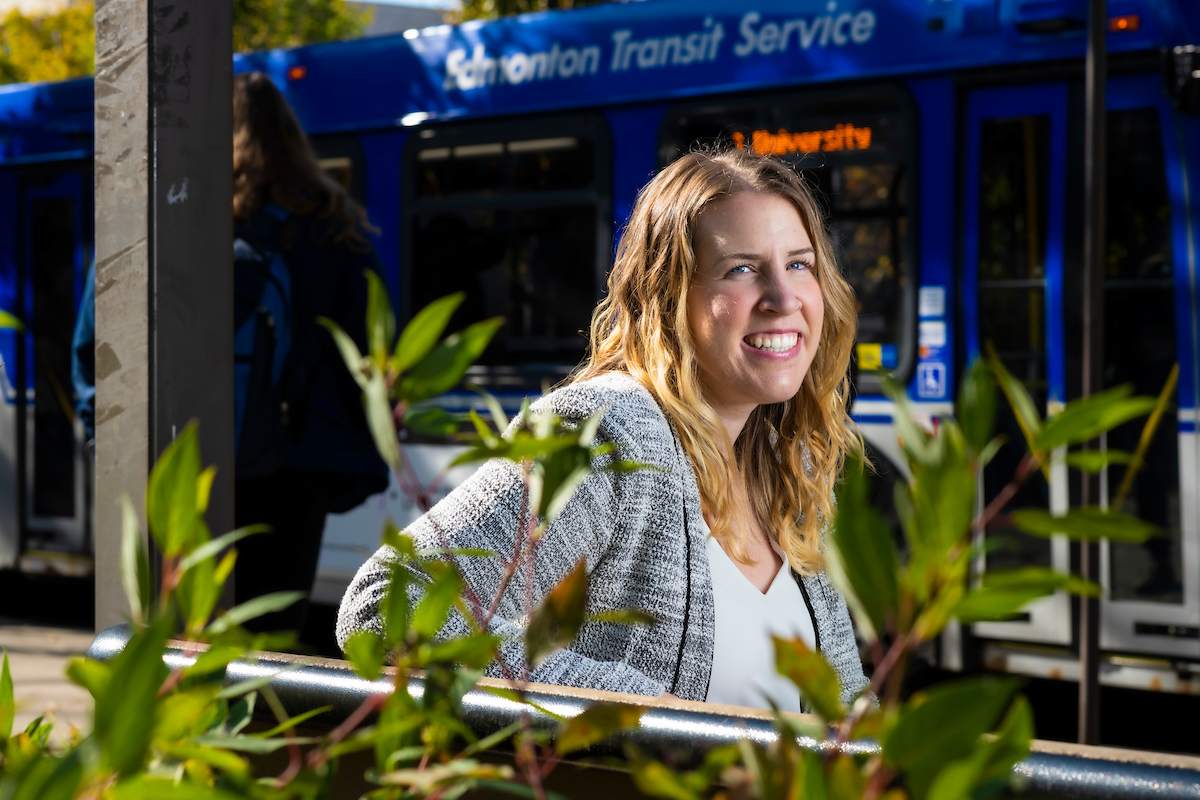
Emily Grise is a new assistant professor in the Department of Earth and Atmospheric Sciences, specializing in public transit and improving the sustainability of our urban centres. Photo credit: John Ulan
As urban centres continue to grow in Canada and the issue of sustainable and effective transportation becomes increasingly prevalent and complex, so too must the solutions evolve. It's this topic that inspires the work of new assistant professor in the Department of Earth and Atmospheric Sciences Emily Grise.
Grise, the newest faculty member in the School of Urban and Regional Planning, is zeroed in on public transit-overcoming the hurdles and challenges that prevent people from adopting this form of transportation.
Grise joins the University of Alberta from McGill University, where she completed her PhD in the School of Urban Planning. Join us in welcoming Emily Grise.
Tell us about your research program.
My research aims to promote the uptake of sustainable transport modes in urban regions. To do so, my research largely focuses on public transport planning from the user perspective. I seek to understand determinants of customer satisfaction and loyalty and how perceptions of transit service influence future decisions of whether to take transit for daily commuting or other utilitarian purposes. In my present work, I focus on improving the quality of existing public transit services and aim to develop policies that are aligned with the needs and demands of existing and potential transit users. Alongside this work, I am interested in researching how other modes of transport (i.e. bicycles, scooters, ride-hailing services) can be used to complement public transit use and ultimately make transit more efficient and comfortable for users.
This is an important field of study for a few reasons. First, the proportion of Canadians residing in urban regions is rapidly growing, and as planners, we need to find means of efficiently and sustainably moving residents in cities. Public transit is, in my opinion, the only mode of transport that can effectively meet the growing demand for travel. Second, we need to shift our travel behaviour away from single occupancy vehicle driving, for reasons such as mitigating climate change and for health benefits associated with reduced time spent driving. With that said, I want to study how we can support the uptake of alternative modes of travel, such as walking, cycling, and transit, in a safe and sustainable manner.
What inspired you to enter this field?
As an individual who does not enjoy driving and who is dependent on a car for my daily travel needs, I wanted to improve our ability to get around cities with alternative means of transportation. There is an extensive amount of research demonstrating the benefits associated with active commuting (ie. transit, walking and cycling), and I wish to work with cities towards the goal of transitioning these active modes of travel away from being considered fringe modes of transport to modes of choice.
Tell us about your teaching.
I will be teaching Geographic Information Systems (GIS) for planners in the winter, quantitative research methods for planners next fall and finally, I will develop a transportation planning course next winter, all in the School of Urban and Regional Planning. I am very excited to teach in a professional planning program because I feel that if I effectively train these future planners, I am preparing these students to be effective professionals who will ideally make a positive impact in their future work. While institutional change in governments takes time, I believe that effectively training future cohorts of students can bring positive change in planning practices.